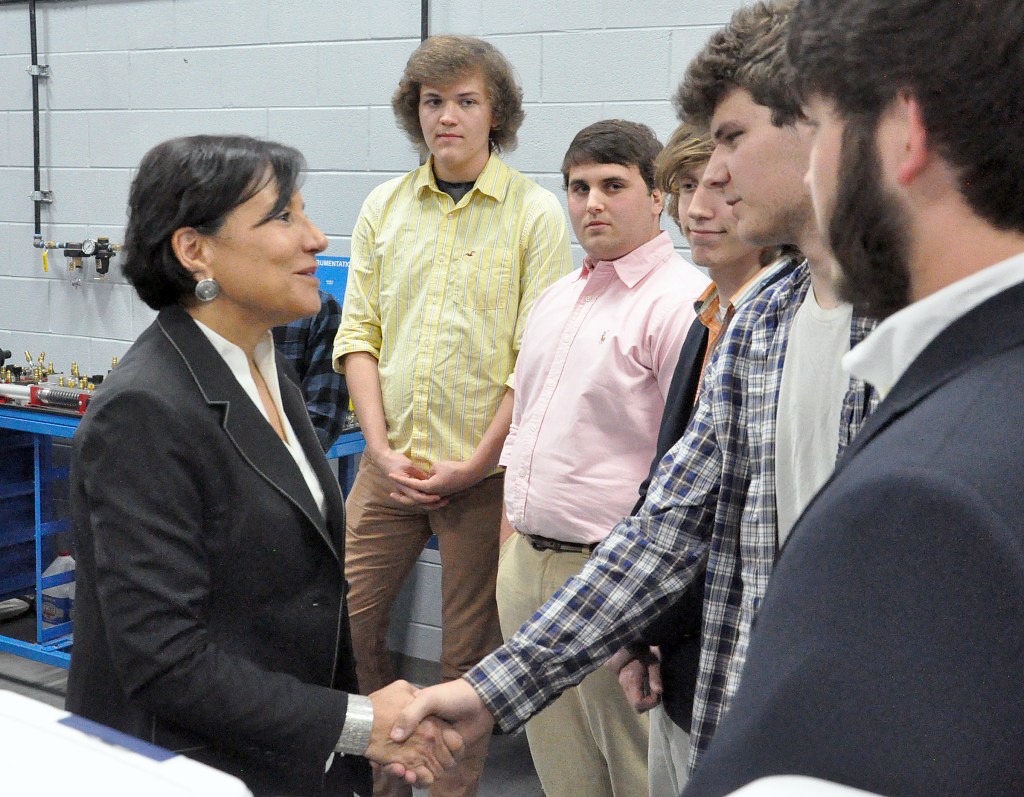Commerce Secretary praises efforts to get young people excited about manufacturing
Published 1:08 pm Monday, May 9, 2016

- Penny Pritzker, left, shakes hands with Matthew Quarles while other Career Academy students look on Friday.
DALTON, Ga. — Three days each week, Alec Longmire reports for work as an apprentice at a large floorcovering manufacturer in the engineering department.
“I assemble and disassemble motors and test them,” he said of his job at Mohawk Industries. “If they are bad, I diagnose what is wrong with it and fix it.”
Trending
During the rest of the week, he reports for classes at the Northwest Georgia College and Career Academy, where he is a senior studying mechatronics, a field that blends robotics, systems engineering and electronics.
Longmire was one of several Career Academy students who met with U.S. Commerce Secretary Penny Pritzker. Pritzker toured the school as part of a visit to Dalton to review its progress in the Communities That Work Partnership.
“We have seven communities that are part of the partnership. The others are Phoenix, San Francisco, Buffalo, Houston, Washington, D.C., and New York City,” she said. “Each has a different area of focus. Dalton’s focus is on advanced manufacturing.”
Pritzker said a key part of that focus is creating the workforce needed by advanced manufacturing companies.
“The one thing I’ve heard over and over is that ‘We need more young people excited about manufacturing,” she said. “We have great jobs but we don’t have the people with the skills to fill them.”
Pritzker said she was excited to see students at the Career Academy with such a passion for manufacturing.
Trending
“They realize that they can be doing mechatronics or computer science or chemistry or logistics and they see how that all points towards a job,” she said. “They are leaving those programs with jobs, good jobs with the potential for advancement and the opportunity to further their education.”
Pritzker said she was also happy to see the Career Academy working with local companies to place students into formal apprenticeships.
“We know that nationally 87 percent of people who complete an apprenticeship end up with a job,” she said. “There’s a growing recognition that only one-third of our workforce needs a four-year college degree. No one wants to discourage a four-year college, but what we do want to do is make young people aware that there are good jobs out there that don’t require a four-year degree. But they have to acquire the skills to fill those jobs.”
David Moeller, CEO of the Career Academy, says the school is a success because of the support of local companies.
“The goal is to build programs for every student. If you want to go to work after high school, we want you to have the skills you need to enter the workforce. If you want to go on for a two-year degree or a bachelor’s degree, we want you to be prepared for that as well,” he said.
Barbara Ward, director of workforce development at the Dalton-Whitfield Joint Development Authority, said the roots of these programs came together during the depths of the Great Recession.
“That was at a time when we had 13 percent unemployment here in Dalton, and industry still could not find people with the skills they needed,” she said.
She said that local industry came together and developed a curriculum for high school mechatronics that was adopted by the Georgia Board of Education.





